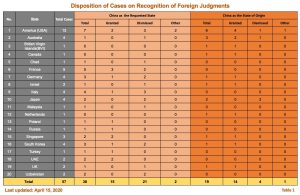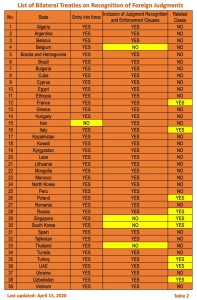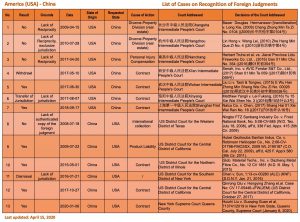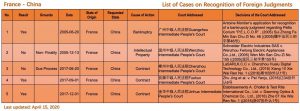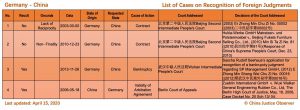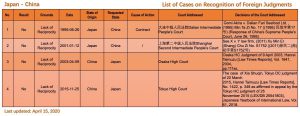Views
Nothing Found
Sorry, no posts matched your criteria
News
Opinion of AG Szpunar on “civil and commercial matters“ according to Article 1(1) Brussels I bis Regulation in Case C-73/19 – Movic
Today, AG Szpunar delivered his Opinion on the request for a preliminary ruling from the hof van beroep te Antwerpen (Court of Appeal of Antwerp, Belgium) on the interpretation of “civil and commercial matters“ according to Article 1(1) Brussels I bis Regulation.
The question was (para. 1o):
“Is an action concerning a claim aimed at determining and stopping unlawful market practices and/or commercial practices towards consumers, instituted by the Belgian Government in respect of Dutch companies which from the Netherlands, via websites, focus on a mainly Belgian clientele for the resale of tickets for events taking place in Belgium, (…) a civil or commercial matter within the meaning of Article 1(1) of [Regulation 1215/2012], and can a judicial decision in such a case, for that reason, fall within the scope of that regulation?“
The relevant Belgium law prohibits, amongst others, the resale of event admission tickets. In addition, the business practice in question falls under the unfair business-to-consumer commercial practices legislation in Belgium. In both cases, the President of the Commercial Court deals with the matter. Actions are brought at the request of the competent minister of the Belgium Government. A variety of measures of relief was sought in the proceedings at hand: (1) a declaration that unfair commercial practices have taken place, (2) an order for cessation of those practices, (3) an order to publicise the court’s decision about the infringement at the expense of the defendants, (4) an order for penalty payments to be made in a fixed amount in respect of every future infringement, and (5) a ruling permitting the fact of such infringement to be certified simply by means of a report drawn up by an official, on oath, of the Algemene Directie Economische Inspectie (Directorate-General for Economic Inspection).
The matter thus was whether or to what extent the expression “civil and commercial matters” in Article 1(1) of the Brussels I bis Regulation, encompasses proceedings of that kind between the authorities of a Member State and private law entities established in another Member State. Evidently, this matter touches upon the delicate question of a private-public divide which generally is perceived to be more and more blurring (see e.g. Burkhard Hess, The Private-Public Divide in International Dispute Resolution, Recueil des Cours Vol. 388, The Hague 2018). Nevertheless, many instruments of Private International Law of the European Union make use of this divide to delineate their respective material scope of application and it may indeed be assumed that the term „civil and commercial matters“ should be interpreted not only autonomously but also consistently across the respective instruments (para. 41, with reference to the ECJ’s judgment of 28 July 2016, Verein für Konsumenteninformation, C?191/15, EU:C:2016:612, paragraph 39), at least in principle. The ECJ has struggled with this question in the past and has tended towards a broad understanding of civil and commercial matters, see e.g. ECJ, judgment of 9 March 2017, C-551/15, EU:C:2017:193 – Pula Parking, for a comment (mainly on other aspects of the case) on this blog see here; see also the recent Opinion by AG Spzunar in Rina, C-641/18, EU:C:2020:3, reported on this blog here. The judgment in Rina is expected to be handed down soon (originally scheduled for 7 May 2020, but was postponed – we will keep you posted). The Opinion im Movic seems to continue this tendency:
The following considerations were taken into account: (1) what does the nature of interests of the public authority to issue its request to the court need or not need to be (paras. 24 et seq.); (ii) in what way does the authority’s powers of investigation influence the analysis (paras. 48 et seq.), and (iii) whether the authority is granted special powers not available to private persons (here in particular the power to certify that infringements have occurred) contribute to the analysis (paras. 63 et seq.).
On the basis of this analysis, AG Szpunar proposed (para. 80) that
“proceedings relating to an action brought by the public authorities of a Member State against persons governed by private law established in another Member State, in which a declaration is sought that infringements constituting unfair commercial practices have taken place, together with an order for the cessation of those practices, an order for measures of publicity at the expense of the defendants, and an order for penalty payments to be made in a fixed amount in respect of every future infringement, fall within the scope of ‘civil and commercial matters’ within the meaning of that provision. On the other hand, such proceedings do not fall within the scope of that expression in so far as they relate to an action in which the public authorities seek the grant of special powers that go beyond those arising from the rules applicable in relationships between private individuals.“
The full text of the Opinion is available here.
Out now: List of China’s Cases on Recognition of Foreign Judgments
Written by Dr Meng Yu and Dr Guodong Du, co-founders of China Justice Observer. [Note: Click on the tables to enlarge them.]
A list of cases on the recognition and enforcement of foreign judgments between China and twenty (20) States and regions has been published by China Justice Observer, a legal information provider based in Beijing. This is a project sponsored by the Academy for the Rule of Law at China University of Political Science and Law. The contributors are Dr. Meng Yu and Dr. Guodong Du, co-founders of China Justice Observer.
You can download the List at:
https://www.chinajusticeobserver.com/a/list-of-chinas-cases-on-recognition-of-foreign-judgments.
The Case List is made available for the readers to build reasonable expectations on recognition and enforcement of foreign judgments (“REFJ”) in China. It comprises public Chinese court decisions involving REFJ, and many (if not all) foreign counterparts concerning the recognition and enforcement of Chinese judgments. Please note that foreign divorce judgments are excluded in the Case List.
To date, China Justice Observer has collected 57 cases involving China and 20 foreign States and regions. The Case List is continually updated with new reports. Case information, comments, and suggestions are most welcome. Please feel free to contact Dr. Meng Yu via e-mail at meng.yu@chinajusticeobserver.com.
For an overview of the disposition of cases on recognition of foreign judgments, please see table 1 below.
For information about bilateral judicial assistance treaties that China and 39 States have concluded, please see table 2 below.
For the detailed country(region) report about cases on recognition of foreign judgments, please see the following charts.
- America (USA) – China
To date, there are 13 court decisions involving the REFJ between China and the United States of America. More specifically:
- In China, there are 7 cases, among which, Chinese courts recognized US judgments in 2 cases, while refused to recognize US judgments in 3 cases.
- In the US, there are 6 cases, among which, the US courts recognized Chinese judgments in 4 cases, while refused to recognize Chinese judgments in 1 case.
Have China and the US concluded any treaty concerning REFJ? No.
What is the prerequisite and basis for Chinese courts to review US judgments? Reciprocity.
For the case info, please see the list above.
- Australia – China
To date, there are 4 court decisions involving the REFJ between China and Australia. More specifically:
- In China, there is one case, where the Chinese court refused to recognize an Australian judgment.
- In Australia, there are 3 cases, among which, the Australian courts recognized Chinese judgments in 2 cases, while refused to recognize Chinese judgments in 1 case.
Have China and Australia concluded any treaty concerning REFJ? No.
What is the prerequisite and basis for Chinese courts to review Australian judgments? Reciprocity.
For the case info, please see the list above.
- British Virgin Islands (BVI) – China
To date, there is one court decision involving the REFJ between China and the British Virgin Islands (BVI). More specifically:
- In the BVI, there is one case, where the BVI court recognized a Chinese judgment.
Have China and the BVI concluded any treaty concerning REFJ? No.
What is the prerequisite and basis for Chinese courts to review the BVI judgments? Reciprocity.
For the case info, please see the list above.
- Canada – China
To date, there is one court decision involving the REFJ between China and Canada. More specifically:
- In Canada, there is one case, where the Canadian court recognized a Chinese judgment.
Have China and Canada concluded any treaty concerning REFJ? No.
What is the prerequisite and basis for Chinese courts to review Canadian judgments? Reciprocity.
For the case info, please see the list above.
- Chad – China
To date, there is one court decision involving the REFJ between China and Chad. More specifically:
- In China, there is one case, where the Chinese court refused to recognize a Chadian judgment.
Have China and Chad concluded any treaty concerning REFJ? No.
What is the prerequisite and basis for Chinese courts to review Chadian judgments? Reciprocity.
For the case info, please see the list above.
- France – China
To date, there are 5 court decisions involving the REFJ between China and France. More specifically:
- In China, there are 5 cases, among which, Chinese courts recognized French judgments in 3 cases, while refused to recognize French judgments in 2 cases.
Have China and France concluded any treaty concerning REFJ? Yes.
What is the prerequisite and basis for Chinese courts to review French judgments? The bilateral treaty.
For the case info, please see the list above.
- Germany – China
To date, there are 4 court decisions involving the REFJ between China and Germany. More specifically:
- In China, there are 3 cases, among which, Chinese courts recognized German judgments in one case, while refused to recognize German judgments in 2 cases.
- In Germany, there is one case, where the German court recognized a Chinese judgment.
Have China and Germany concluded any treaty concerning REFJ? No.
What is the prerequisite and basis for Chinese courts to review German judgments? Reciprocity.
For the case info, please see the list above.
- Israel – China
To date, there are 2 court decisions involving the REFJ between China and Israel. More specifically:
- In China, there is one case, where the Chinese court refused to recognize an Israeli judgment.
- In Israel, there is one case, where the Israeli court recognized a Chinese judgment.
Have China and Israel concluded any treaty concerning REFJ? No.
What is the prerequisite and basis for Chinese courts to review Israeli judgments? Reciprocity.
For the case info, please see the list above.
- Italy – China
To date, there are 4 court decisions involving the REFJ between China and Italy. More specifically:
- In China, there are 4 cases, among which, Chinese courts recognized Italian judgments in one case, while refused to recognize Italian judgments in 3 cases.
Have China and Italy concluded any treaty concerning REFJ? Yes.
What is the prerequisite and basis for Chinese courts to review Italian judgments? The bilateral treaty.
For the case info, please see the list above.
- Japan – China
To date, there are 4 court decisions involving the REFJ between China and Japan. More specifically:
- In China, there are 2 cases, where Chinese courts refused to recognize Japanese judgments.
- In Japan, there are 2 cases, where the Japanese court refused to recognize Chinese judgments.
Have China and Japan concluded any treaty concerning REFJ? No.
What is the prerequisite and basis for Chinese courts to review Japanese judgments? Reciprocity.
For the case info, please see the list above.
- Malaysia – China
To date, there is one court decision involving the REFJ between China and Malaysia. More specifically:
- In China, there is one case, where the Chinese court refused to recognize a Malaysian judgment.
Have China and Malaysia concluded any treaty concerning REFJ? No.
What is the prerequisite and basis for Chinese courts to review Malaysian judgments? Reciprocity.
For the case info, please see the list above.
- Netherlands – China
To date, there is one court decision involving the REFJ between China and the Netherlands. More specifically:
- In the Netherlands, there is one case, where the Dutch court recognized a Chinese judgment.
Have China and the Netherlands concluded any treaty concerning REFJ? No.
What is the prerequisite and basis for Chinese courts to review Dutch judgments? Reciprocity.
For the case info, please see the list above.
- Poland – China
To date, there is one court decision involving the REFJ between China and Poland. More specifically:
- In China, there is one case, where the Chinese court recognized a Polish judgment.
Have China and Poland concluded any treaty concerning REFJ? Yes.
What is the prerequisite and basis for Chinese courts to review Polish judgments? The bilateral treaty.
For the case info, please see the list above.
- Russia – China
To date, there is one court decision involving the REFJ between China and Russia. More specifically:
- In China, there is one case, where the Chinese court recognized a Russian judgment.
Have China and Russia concluded any treaty concerning REFJ? Yes.
What is the prerequisite and basis for Chinese courts to review Russian judgments? The bilateral treaty.
For the case info, please see the list above.
- Singapore – China
To date, there are 3 court decisions involving the REFJ between China and Singapore. More specifically:
- In China, there are 2 cases, where Chinese courts recognized Singaporean judgments.
- In Singapore, there is one case, where the Singaporean court recognized Chinese judgments.
Have China and Singapore concluded any treaty concerning REFJ? No, but the heads of the supreme courts in China and Singapore signed China-Singapore Memorandum of Guidance on Recognition and Enforcement of Money Judgments (Memorandum of Guidance).
What is the prerequisite and basis for Chinese courts to review Singaporean judgments? Reciprocity.
For the case info, please see the list above.
- South Korea – China
To date, there are 4 court decisions involving the REFJ between China and South Korea. More specifically:
- In China, there are 3 cases, among which, the Chinese courts recognized a South Korean judgment in one case, while refused to recognize South Korean judgments in 2 cases.
- In South Korea, there is one case, where the South Korean court recognized a Chinese judgment.
Have China and South Korea concluded any treaty concerning REFJ? No.
What is the prerequisite and basis for Chinese courts to review South Korean judgments? Reciprocity.
For the case info, please see the list above.
- Turkey – China
To date, there is one court decision involving the REFJ between China and Turkey. More specifically:
- In China, there is one case, where the Chinese court recognized a Turkish judgment.
Have China and Turkey concluded any treaty concerning REFJ? Yes.
What is the prerequisite and basis for Chinese courts to review Turkish judgments? The bilateral treaty.
For the case info, please see the list above.
- UAE – China
To date, there are two court decisions involving the REFJ between China and the UAE. More specifically:
- In China, there are two cases, where the Chinese courts recognized UAE judgments.
Have China and the UAE concluded any treaty concerning REFJ? Yes.
What is the prerequisite and basis for Chinese courts to review UAE judgments? The bilateral treaty.
For the case info, please see the list above.
- UK – China
To date, there are 2 court decisions involving the REFJ between China and the UK. More specifically:
- In China, there is one case, where the Chinese court refused to recognize British judgments.
- In the UK, there is one case, where the British court recognized a Chinese judgment.
Have China and the UK concluded any treaty concerning REFJ? No.
What is the prerequisite and basis for Chinese courts to review British judgments? Reciprocity.
For the case info, please see the list above.
- Uzbekistan – China
To date, there are two court decisions involving the REFJ between China and Uzbekistan. More specifically:
- In China, there are two cases, where the Chinese courts refused to recognize Uzbekistani judgments.
Have China and Uzbekistan concluded any treaty concerning REFJ? Yes.
What is the prerequisite and basis for Chinese courts to review Uzbekistani judgments? The bilateral treaty.
For the case info, please see the list above.
Singapore Convention on Mediation to enter into force on 12 September 2020
Qatar is the third signatory State to the UN Convention on International Settlement Agreements Resulting from Mediation (“Singapore Convention on Mediation”) to have ratified it. The other two are Singapore and Fiji (see previous post here). The Convention will enter into force after the deposit of three instruments of ratification. As Qatar deposited its instrument of ratification on 12 March 2020, the Convention will enter into force on 12 September 2020. The status table may be found here.



